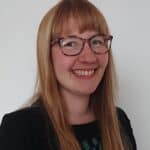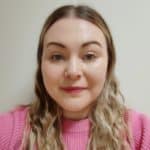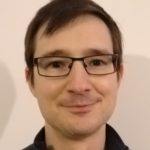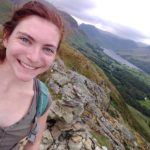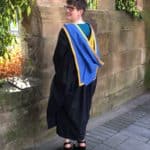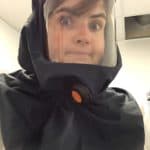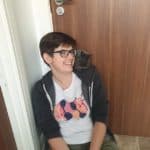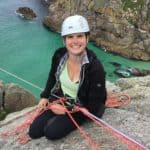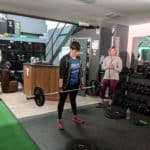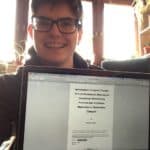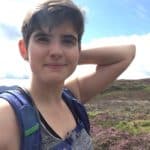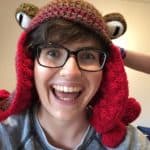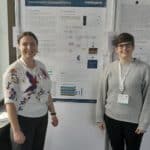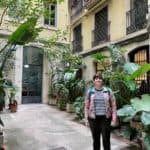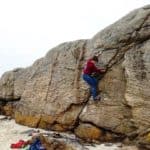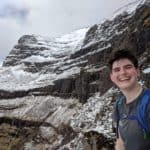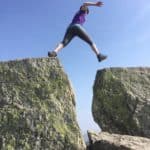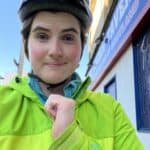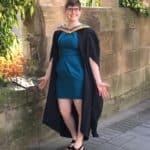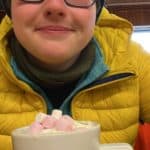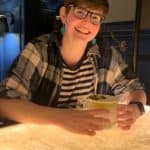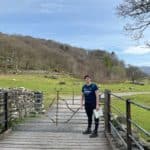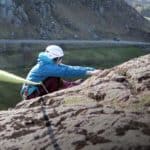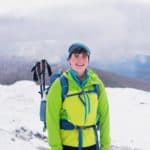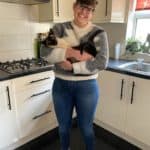Profile
Heather Walton
-
About Me:
I live in Glasgow, work as a chemist in a factory, and enjoy all kinds of outdoor activities – running, hill-walking, climbing, watersports – but not being cold! I also keep as many houseplants as can fit in my flat and dream of having a vegetable garden some time in the future (and a cat).
-
Read more
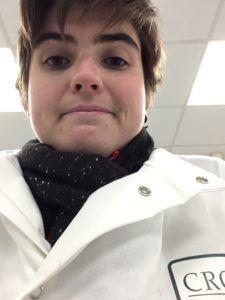
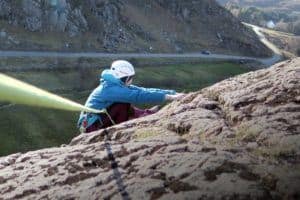
My name is Heather, pronouns she/her, I am 26 and I am a chemist. I live in Glasgow, and moved here from Inverness 8 years ago to go to University.
I did a 5 year course at the University of Strathclyde in Glasgow which was a mixture of taught classes (lectures and practical labs) and working on research projects, in the university and on placement in chemical industry. For my fourth year I did an industrial placement in Liverpool making the ingredients for sun cream that mean it protects you from the sun! I enjoyed living in Liverpool and exploring somewhere new, but was also very happy to come back to Glasgow for my fifth year and see all my friends I’d missed while I was away.
In my summers between uni years I did a variety of jobs, from a chemistry summer placement to working as an outdoor activity instructor at a PGL holiday camp. I planned to move to Canada which I finished uni, but it was 2020 and the middle of lockdown so instead I got a job at a factory making medicines in Livingston. I worked there for about 3 years, then moved to my current role at the Medicines Manufacturing Innovation Centre in Glasgow, which is also a factory but has the extra purpose of demonstrating new technologies to industry.
I don’t have any pets but when I lived in Liverpool my housemate had a cat and I would like to get one in the future. I have lots of houseplants, I think 33 at the moment, including a palm tree that’s almost as tall as me who is called Larry! I also love octopi, but don’t think I could reasonably have one as a pet. Instead my lovely friends made me a knitted on for my birthday, he is called Raphael.
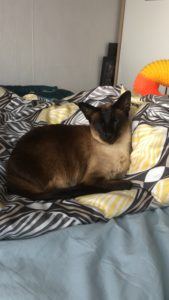
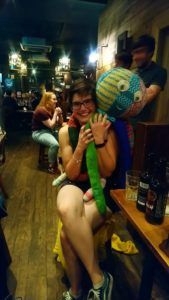
While I’ve been at uni I’ve learnt to rock climb, and now climbing, hill-walking and running outdoors are my favourite hobbies. I also like to swim and do weight-lifting training when I’m stuck in the city for uni or work. Indoors my hobbies include reading, baking, knitting and sewing, as well as playing fiddle/violin.
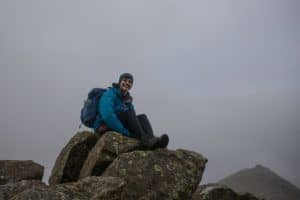
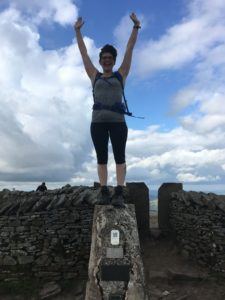
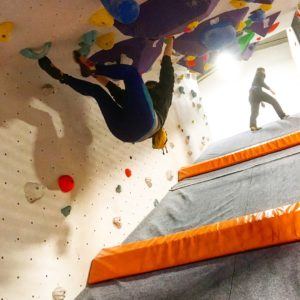
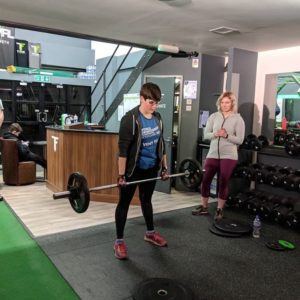
-
My pronouns are:
She/her
-
My Work:
Current work – Setting up a factory to sustainably make DNA-based drugs on large scale
Previous work – Making forms of drugs that can be taken by mouth rather than injected, so people can take them at home
At uni – Working on new methods and catalysts to make chemical manufacture and testing quicker and more sustainable.
Industrial Placement – Developing the ingredients for sun cream which protect your skin from the sun! -
Read more
Whilst at university I worked on two different research projects with two different research groups:
Summer placement after 2nd year – The group I worked with are experts in ‘labelling’ molecules with ‘heavy hydrogen’, special atoms which you can pinpoint and ‘see’ with the right equipment. Using drug molecules with these special labels means that drug trials can ‘follow’ the drugs through the body and see whether they, for example, go to the right place or build up somewhere where they might cause a side-effect. This method is therefore useful to speed up the testing of new drugs, and saves a lot of time, money and materials.
However, at the moment the special label atoms can only be added to certain types of drugs. To speed up the testing of all drugs, chemists need to work out ways to either label new kinds of drugs or ways to make more complicated drugs out of simple ones which have already been labelled. My project was working on the second of those possibilities. I spent 9 weeks working in the lab, and by the end I had made 1 labelled drug molecule! It was hard work but very interesting, and I learnt a lot about how to do a real research project, where most things you try don’t work!Masters project in 5th year – Chemicals called ‘catalysts’ are used in a lot of chemical manufacturing processes all over the world, and without them the important chemical reactions needed to make the products – drugs, pesticides, fuels, foods – would not work. However a lot of catalysts are made of precious metals – silver and gold and also platinum, palladium, rhodium and iridium which are even rarer. When they were first invented these metals weren’t used for many other applications, and only a very small amount of catalyst is required for each factory and can last many years, so no-one worried that the metals might run out. Nowadays, however, all of these metals are used in smartphones and computers, and there is a very real risk that they will run out. This has already made them very expensive. For that reason chemists are working on new catalysts which are made from metals that are less rare, so that their use would be sustainable, as well as cheaper. My project worked on making catalysts using Magnesium. Again, this was hard which on the surface didn’t have much success, in the whole project I didn’t make any successful catalysts that were stable solids and could actually be used in a factory! But I did find out some of the reasons that cause them to break down, which will be useful in future work on these catalysts, and I learnt a lot about the subject and also how to work in a lab by myself, which is pretty important since being a student is really training for the future.
I also did a year long industrial placement working as a research scientist for a company which makes the ingredients for sun cream. I worked on making new products which contain nano/micro sized particles of metal oxides, which are physical filters to UV radiation so protect your skin from this dangerous radiation. These are very relevant at the moment because the alternative, chemical filters, have been banned in some places because they are thought to damage coral reefs. Really most sun cream you buy will contain a mixture of chemical and physical filters, and chemists need to develop better physical filters before we can stop using chemical filters. For example, sun cream made with physical filters only tends to leave white marks on your skin, which means people don’t want to wear it, but chemists are working to change the size of the metal oxide particles used to stop this problem.
Since uni I have worked full time in the pharmaceutical (drug) industry, and I have worked on lots of projects for lots of companies. In my first work place I did both lab-based work and manufacturing in a clean room factory, making capsules containing drugs for people to take by mouth. In my current job, I do more desk-based work, as we are currently planning the set up of a factory, to make DNA based drugs. This factory will demonstrate new technology, so be highly automated, but I hope to still get to do some work by hand, it’s fun!
-
My Typical Day:
I get up at about 7:30, eat cereal and drink tea then leave at 8 to drive to work for 8:30. I work 8:30 until 17:00 with an hour for lunch. Just now I do desk-based work, as we are currently planning the set up of a factory. I sometimes go to the gym in the evening, or see friends, or relax at home.
-
Read more
07:30 – wake up. Eat cereal and drink tea
08:00 – drive to work
08:30 – start work, normally with chat to colleagues!
09:00 – planning meeting
09:30 – independent work
12:00 – lunch
13:00 – meeting, working with team
14:00 – independent work
16:00 – meeting with client online
17:00 – finish work, go to the gym
20:00 – go home, eat dinner
20:30 – watch TV/read/craft
22:45 – bed time
-
What I'd do with the prize money:
A hands-on chemistry activity, at an accessible location. This would be run by a group who could also answer questions about either going to university or the alternative routes into a STEM career.
-
Education:
I went to two different primary school in Inverness, first Drakies then Inshes when it opened because it was closer to my house and was where the school bus went!
Then I went to Millburn Academy (also Inverness) all the way through to S6.
Just after I turned 18 I moved to Glasgow to study Chemistry at the University of Strathclyde. I did a 5-year integrated masters course, for the first 3 years this was a mixture of lectures (in the mornings) and lab classes (in the afternoons). Then I went on a year-long Industrial Placement to work for a speciality chemical company in Liverpool. For my 5th year I came back to Glasgow and again did a mixture of lectures (mornings) and lab work (afternoons) but this time the lab work was a research project working in one of the university labs. Although the course was long it has been really good experience, I am finishing uni with a year of work experience (which I also got paid for!) and a Masters degree. -
Qualifications:
S4 (age 15): Standard Grade Maths, English, Chemistry, Physics, Geography, Graphic Communication. Int 2 French, Spanish.
(These are all the equivalent to National 5s or GCSEs, I was just at school at the strange time where they were changing between different names!)S5 (age 16): Higher Maths, English, Chemistry, Physics, Spanish.
S6 (age 17): Advanced Higher Chemistry, Physics, Spanish. Higher Biology. National 5 Gaelic.
My school let us do whatever we wanted in our last year of school, so I took a lot of courses because I couldn’t decide between them. While I enjoyed them all, I’m not sure I would recommend it, I had a very very busy sixth year!Uni (5 years, finished age 22): MChem Pure and Applied Chemistry with Industrial Placement, University of Strathclyde.
-
Work History:
Shop Assistant, Co-op Food – Worked here during my last 2 years of school and my first year of uni.
Activity Instructor/Group Leader, PGL Travel – Probably the most fun job I’ve had, but hard work! I did this in the summer between 1st and 2nd year of uni.
Research Internship, University of Strathclyde – I worked in a lab on an organic chemistry research project in the summer between my 2nd and 3rd year of uni.
Receptionist, Climbzone – I was a receptionist and giant slide operator at Climbzone during my 3rd year of university until I moved to England to do my industrial placement.
Industrial Placement Student Research Scientist, Croda – For a year during uni I worked in the development of the active ingredients for sun cream.
Formulation Support Technician, then Formulation Scientist, then Senior Scientist – Lonza/NextPharma – worked on the development and manufacture of drugs to be taken by mouth
-
Current Job:
Senior Chemist, Centre for Process Innovation (CPI) – Work at the Medicines Manufacturing Innovation Centre, aiming to demonstrate a sustainable way to manufacture DNA-based drugs on large scale
-
Employer:
Centre for Process Innovation (CPI)
-
My Interview
-
How would you describe yourself in 3 words?
Enthusiastic, Interested, Friendly
What did you want to be after you left school?
A chemistry teacher
Were you ever in trouble at school?
Yes, mainly for talking too much
If you weren't doing this job, what would you choose instead?
Translator
Who is your favourite singer or band?
Green Day
What's your favourite food?
Rice Pudding
If you had 3 wishes for yourself what would they be? - be honest!
That I could be confident I was making the right decisions! That I could add a couple of hours to each day by sleeping less, but not feel tired! That I could keep up with all the lovely people I've met even though some of them are far away!
Tell us a joke.
Three cats were going to have a race to swim across a lake. There was an english cat called 'one two three', a french cat called 'un deux trois' and a spanish cat called 'uno dos tres'. On the day of the race, the spanish cat, 'uno dos tres', returned first and won. They were closely followed by the english cat, 'one two three'. However, the french cat did not return, because un deux trois cat sank!
-

